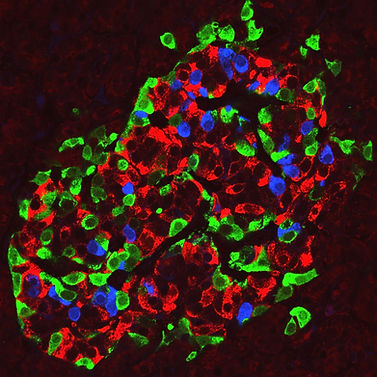University of Miami
Caicedo Group

The pancreatic islet
Our research group investigates the anatomy and physiology of the pancreatic islet. Endocrine cells of the islet secrete hormones that help regulate glucose metabolism. The islet contains the beta cell, which is the only cell in the body that produces and secretes the hormone insulin. Beta cell failure or death is a major cause of diabetes. Beta cells are surrounded by other endocrine cells. They also interact with nerves, blood vessels, and local immune cells. We propose that the beta cell cannot function without the support of its neighborhood. The central tenet of our work is that the islet is the functional unit of the endocrine pancreas.
Harnessing Innervation to Promote Pancreatic Islet Function (PI: Caicedo) 2017-2021
Cholinergic Signaling in the Human Pancreatic Islet (PI: Caicedo) 2016-2019
ONGOING NIH-FUNDED PROJECTS
Role of Pericytes in Pancreatic Islet Fibrosis (PI: Almaça) 2016-2021
Autonomic Sensory Innervation of the Pancreatic Islet of Langerhans (PI: Makhmutova) 2016-2019
The role of the Delta Cell in Islet Homeostasis (PI: Rodriguez-Diaz) 2017-2020
In situ Analysis of Functional Endocrine, Vascular, and Immune Cell Interactions during Early Postnatal Development of the Human Pancreas (PI: Caicedo) 2018-2022
RESEARCH INTERESTS
Neighbors

Beta cells (red) intermingle with glucagon secreting alpha cells (green) and somatostatin secreting delta cells (blue) in the human islet. This arrangement allows for strong paracrine interactions. Our research identified novel paracrine signaling pathways in the human islet. We investigate how paracrine signaling regulates the islet's hormonal output. We are testing if receptors for paracrine signals can be targeted to improve insulin release.
Blood vessels

Insulin and glucagon delivery into the systemic circulation depends on efficient hormone release into the local islet microcirculation (blood vessels are shown in green in the picture). We are investigating the cellular components of the islet vasculature. Our work focuses on the effects local vascular dysfunction has on islet hormone secretion, glucose metabolism, and the pathogenesis of diabetes.
Nerves

Since their discovery, it is known that pancreatic islets are innervated (nerves are shown in different colors in the picture). The mechanisms nerves use to regulate islet function remain unknown, in particular in the human islet. We are investigating how nerves act locally on endocrine, vascular, and immune cells to modulate hormone secretion, blood flow, and immune responses in the islet.